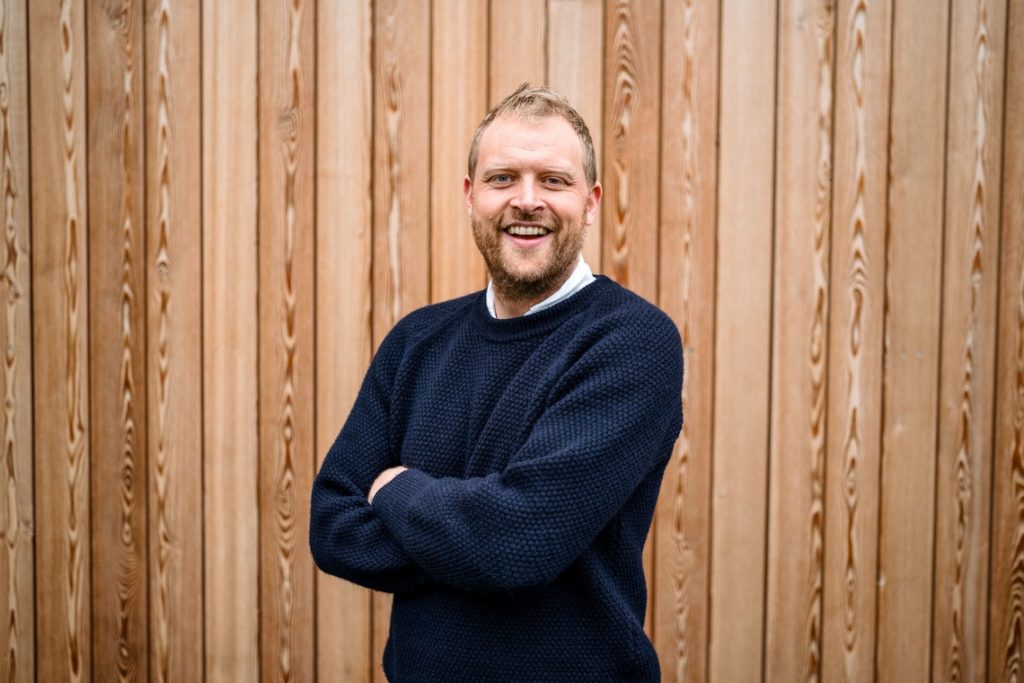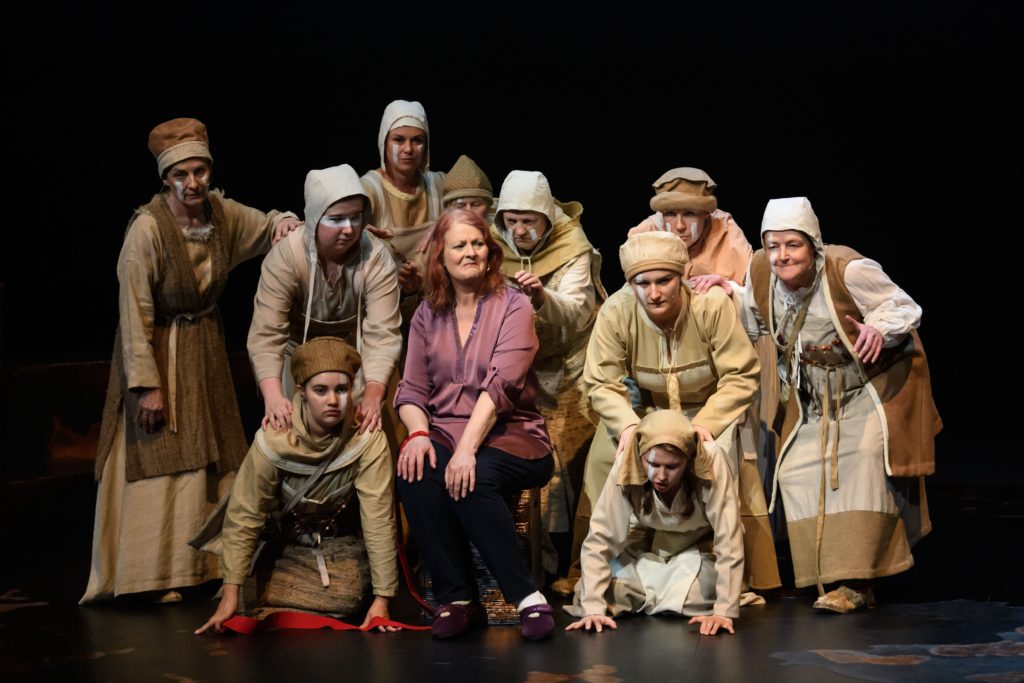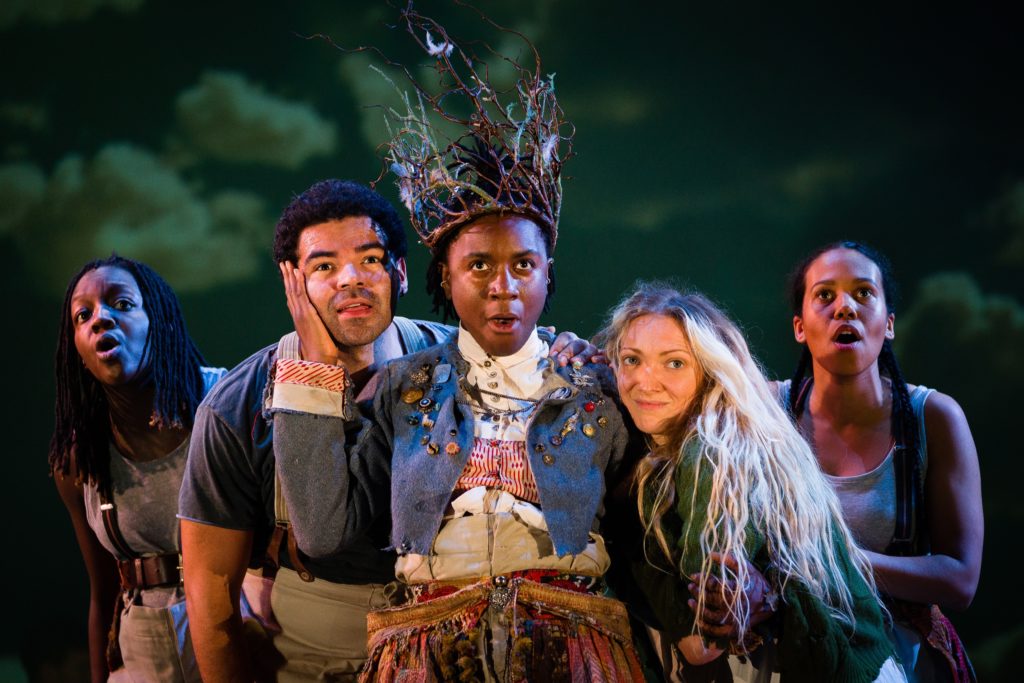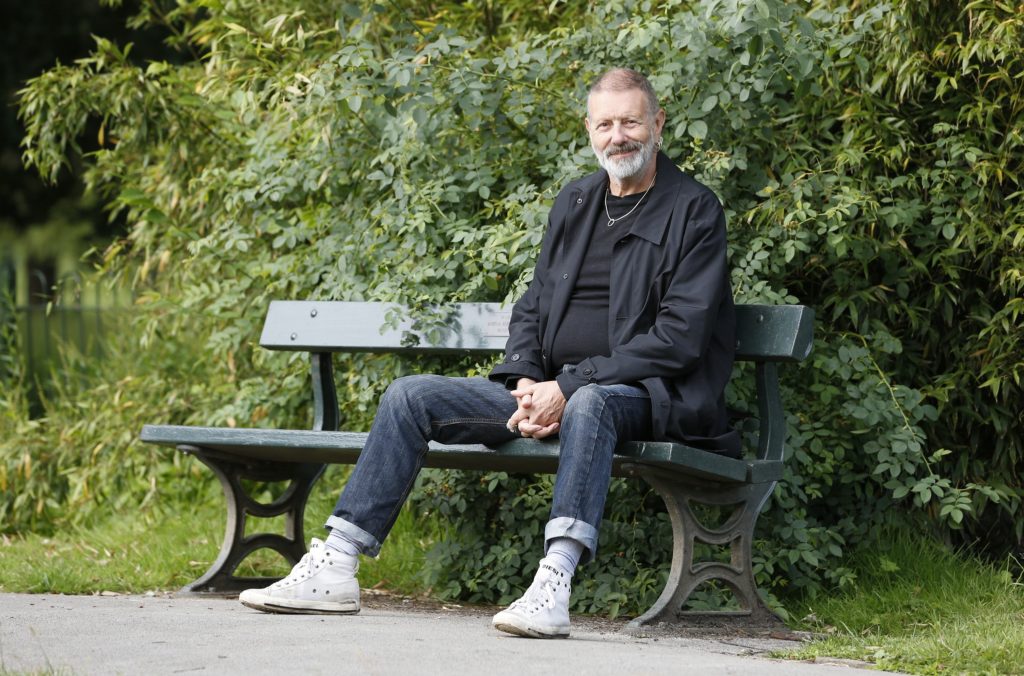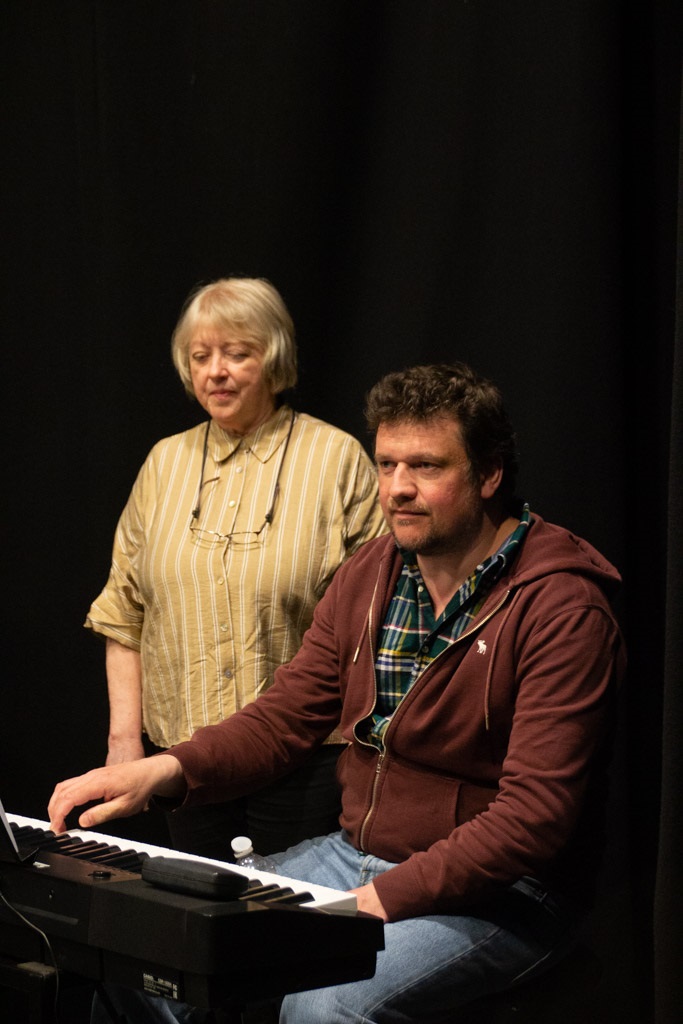
THE York Theatre Royal Choir may be pretty much out of view to the side of the King’s Manor courtyard in this summer’s community play, but its contribution is central to the impact of Sovereign.
Come rain or more rain, the choir performs Dominic Sales’s compositions under the musical directorship of Madeleine Hudson, who has held that post since the choir’s formal formation in 2016.
Dominic, who played his part in setting up the choir, has past experience of Theatre Royal community plays, having provided the music for In Fog And Falling Snow at the National Railway Museum in July 2015.
“From what I remember, the opening was amazing with this steam train arriving in the style of Zadok The Priest. I was ripping off Handel completely!” he says.
“But normally I tend to forget what I’ve written as soon as I’ve written it. I don’t know if it’s a good thing or not, but probably yes, as it stops me from writing the same thing again!”
The community choir grew out of the 2015 production. “We set up a choir just for that show and originally it wasn’t going to continue afterwards, but they so loved working with Maddie [Madeleine Hudson] – this Irish lady who I’d worked with before – that they wanted to continue.
“I’d suggested Maddie should be the musical director, and they really had their moment in that show in the second half in the tent. It was the biggest cast I’ve ever worked with. Ginormous! Just waiting for 250 people to get on stage takes long enough!”
Emerging from a couple of years of “doing a little online stuff for small companies” under the pandemic cloud, Dominic wrote speculatively to Juliet Forster at the Theatre Royal, where he had provided the score for her 2014 production of Harold Pinter’s Betrayal and had first made his musical mark in Leeds company Tutti Frutti’s touring shows.
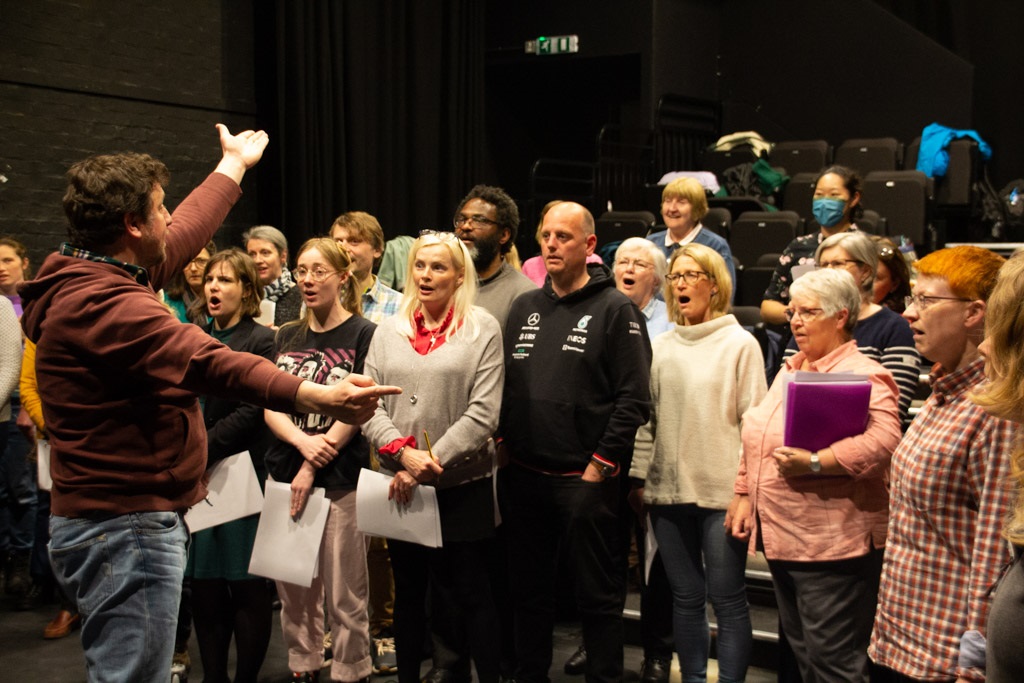
“I had no idea Juliet now had the role of creative director,” he says, but his Sales pitch could not have been more productive. “She said ‘yes’ to me doing this show, delightfully without giving me any brief, other than details of the setting and the synopsis.”
Co-directed by Juliet, John R Wilkinson and Mingyu Lin, Sovereign is a Tudor-set thriller, adapted by prolific York playwright Mike Kenny from CJ Sansom’s novel, with Henry VIII’s visit to King’s Manor at the story’s core.
“Vocal music was the most popular music of the time – Baroque music – and so I’ve written a score for a choir with room for 36 voices per performance in the courtyard,” says Dominic.
“Recorder features too as it was also very popular in Tudor times, and we’re delighted to have an international recorder player, Carmen Troncoso, who’s a PhD student in the Early Music department at the University of York, playing in the show.”
Dominic has taken his inspiration from madrigals. “I was a chorister at Canterbury Cathedral in my schooldays, when I was made to sing in a madrigal group on Saturday mornings with Mr Thompson in a shed in a field that was called the music department,” he recalls.
“Being a chorister was a great thing to do, but having to sing madrigals every Saturday morning was the downside!”
Nevertheless, madrigals make for a magical sound at King’s Manor, where the 63 choir members share out the performances. “The choir is taking the weight of the score, underscoring the dialogue, so it’s quiet and atmospheric with a few moments where they get to let rip,” says Dominic. “As with most of my scores, I’ve written music to get talked over.
“The choir has 44 musical cues, singing material that’s quite dark because it’s a pretty dark and sombre story. The way I tend to approach writing the music is to gain a general overview of the characters and the story and then sketch out the songs. So you have the play’s thematic material to then create the sound world for it.
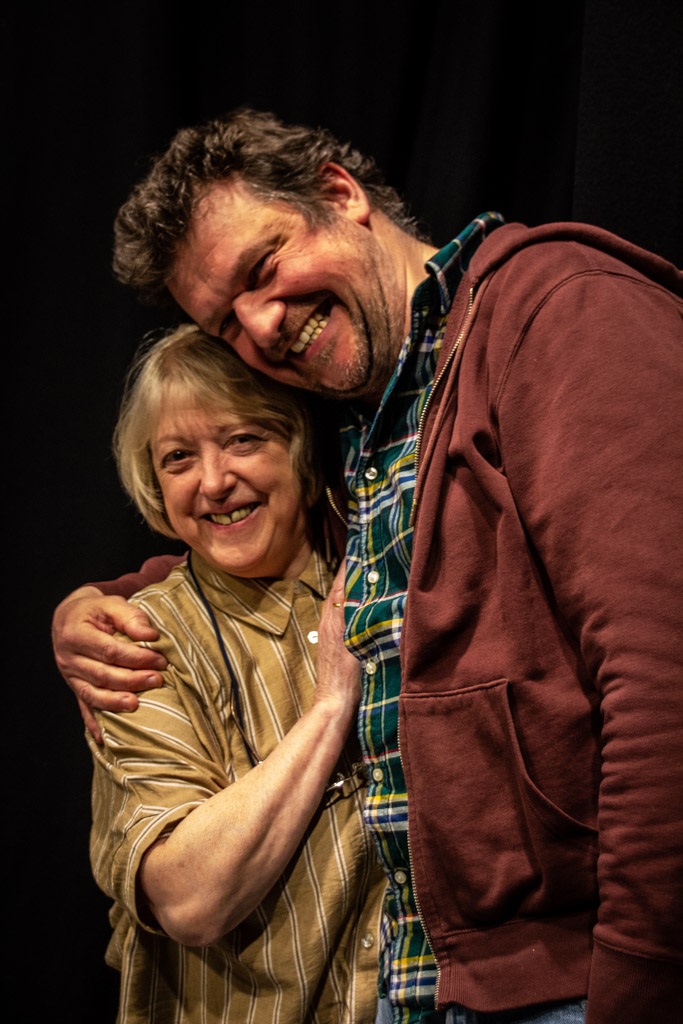
“It’s quite functional what I do, the most artistic element being that creativity and then being functional in making it fit in with each cue.”
Dominic, who studied composition and performance at the University of Huddersfield, is a “percussionist by trade”. “My tutor was Chris Bradley, principal percussionist for Opera North, and I then played triangle for Opera North. Someone’s got to do it!” he says. “My mum came to watch me performing at Sadler’s Wells, which was great, but she could only see my hands!”
Since 2015, he has taken the drum seat for the Pasadena Roof Orchestra, recording and touring the world with the dapper combo. “Before that I had ‘depped’ for the drummer that had the job before me. He left, and I felt very lucky to get the gig as it was a dream come true. It’s enormous fun,” he says.
He has played drums and percussion for numerous symphony orchestras and for West End shows too, latterly Anything Goes at the Barbican. “My favourite was An American In Paris, no big names in the show, but it was the wonderful Broadway production of the Gershwin musical,” says Dominic.
“The West End is great but you’re doing the same thing night after night, and you have to get your head round that if you’re doing it for a year, when it comes down to muscle memory. I tend to do shows with larger bands – there were 18 in the pit for Anything Goes- whereas a lot of modern shows have smaller bands.”
Composer (for 30 years), percussionist for bands, orchestras and stage shows, and record label founder to boot, Dominic has one more string to his bow: he teaches at the London College of Music. Not that he is one to bang his own drum for such polymath skills.
York Theatre Royal and the University of York present Sovereign at King’s Manor, Exhibition Square, York, until July 30. Tickets update: Sold out.
Did you know?
DOMINIC Sales is the founder and director of Jellymould Jazz, a boutique record label with worldwide distribution at the forefront of the British jazz scene.

